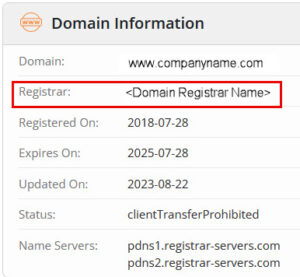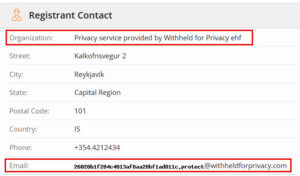In the vast landscape of the internet, websites come and go, each leaving its own digital footprint. However, what happens when the lease on a website’s virtual real estate expires? A website domain is akin to an address on the internet, providing users with a way to access a particular website. An expired domain means the website owner has not renewed their ownership of that virtual address. What may seem like an easy problem to fix is in reality a complex issue fraught with roadblocks and consequences.
In this post, we’ll discuss the situation in which a domain can expire, the potential consequences, how to locate your domain registrar, and how a website owner can maintain good domain hygiene to avoid an expired domain in the first place.
What is a Domain Registrar?
First things first. We’re going to be mentioning the term ‘domain registrar’ a lot in this post so let’s define it. A domain registrar provides domain name registrations to the general public. It’s the company that “sells”, or more accurately, leases your domain name. For example, our domain name is precisionpages.com.
A domain registrar is typically a large company that also integrates other services into their offerings such as DNS hosting. Your domain is an individual line item you pay for, typically annually.
It’s important to understand the difference between a domain registrar, a DNS host, and a website host.
- Domain registrar: where a website owner registers their domain name, i.e., companyname dot com
- DNS (Domain Name System) hosting: This is usually part of your domain registrar’s offerings as it’s the network component that allows a website to be identified by its domain name, and not just an IP address. This is so a user doesn’t have to memorize and type in an IP address, which isn’t practical.
- Website hosting: Website hosting is how a website is made accessible on the internet. The website is hosted on a server by a company that provides the space for the files, and maintains the website platform, or Content Management System (CMS), such as WordPress.
A common misconception by website owners is that their website hosting vendor is also taking care of their DNS hosting, and/or domain renewal. This is usually not the case. Often the domain was reserved by someone other than the hosting vendor or website developer, at the very beginning of the process.
Then, the website is built by a vendor, and either hosted by that same vendor, or a different one. It’s easy to end up with multiple people and vendors connected to the birth and maintenance of your website. Especially when you consider companies often redo their website, move it to another CMS, and a new website vendor does that design, build, and hosting. Here’s a common scenario: the website is designed (or redesigned) and pushed live. The hosting company is paid. The designer is paid. But the domain responsibility is forgotten. That is the piece that becomes a bit of a ticking time bomb.

What Happens to an Expired Domain?
Domains are usually renewed and paid for annually. Prior to your domain expiring, your domain registrar will send multiple emails to notify of pending expiration, typically 30 days out. But what if the email notifications are not going to your email address, but to an old employee or someone else who initially set up your domain? You will never know your domain is about to expire. This happens more often than you might think.
Sometimes, the first person to know that something is wrong is your website hosting company (like us, Precision Pages). They get a notification that the site is down and they investigate why. But, if your website hosting company was not involved in your domain registration they can’t help unless you have access to your domain registrar.
Now you have an expired domain. Your website is down. And your email is down.
Most people don’t think about the fact that your email goes down along with your website! Your email with your company name behind the @, is part of your domain. This is not only a major problem for obvious business implications, but as you perform damage control and attempt to access your domain registrar, you can’t even access any verification emails that might be sent to you. For example: you forgot your password to your registrar account and need to reset it.
When your domain expires, it becomes “parked” according to domain registrar language. It’s as if it’s in domain purgatory; it can’t be purchased by anyone for a period of time. But with many domain registrars you can’t just purchase and renew your domain, you must pay a redemption fee first. If you don’t respond in a certain number of days (with some domain registrars it’s only 30 days), the domain is released to the public for a domain auction. You as the website owner must prove ownership within the window that your domain is parked to get your account current and your website back online.
The Perfect Storm for an Expired Domain
Remember when we discussed how the pieces of your website are often set up by multiple people and vendors? Well, as years go by, situations change. Employees leave the company, companies go out of business, or the contact info for the friend who “knows websites” and set up your domain/DNS is lost.
You could be asking for trouble just by the way your website was set up.
Here’s the perfect storm for domain expiration:
- You lost the login info for your domain registrar account
- The login for your domain registrar account is in someone else’s name (old vendor or friend) but you don’t know who that is
- The login for your domain registrar account is in a former employee’s name/email and that email no longer works
- You don’t know who your domain registrar is (there is a way to find this out, but the information is limited due to privacy)
How to Find Out Where Your Domain is Registered
If you have no idea who your domain registrar is there are some options to quickly find out. We recommend a couple of lookup services that help with this:
These services work because your website is a public site on the internet that can be looked up, whether it’s currently live or not. The lookup page will show where a website domain is registered and now you have at least one important piece of the puzzle.
However, this doesn’t get you access to your domain registrar, only a location from which to start.
As an aside, because a lookup service can be used by anyone to see where a website domain is registered, scammers can take advantage of this. What has happened in the past to some companies is that a spammer looks to see where a domain is registered and who the contact is, and sends them what looks like an annual bill for their domain. The business owner is busy and doesn’t pay attention to website related fees so they pay the bill because they think they need to. But really it’s an agreement to switch your domain to another registrar and start paying them. Business owners can get easily tripped up by this, it’s called slamming.
Related Read: Website Domain Renewals: Beware of Slamming
As a result of incidents like slamming, most domain registrars now conceal any personal contact information from showing in lookup service results. This privacy is part of what you pay for with your domain registration.
But that makes it very difficult for a business owner to access their registrar and get their site back online if they have no contact/login information whatsoever.
Damage Control with an Expired Domain
If you do not have the login for your domain registrar, and do not have the contact information for anyone that set it up, you will have to move to the next step in damage control for an expired domain.
The next step in the process is to prove that you are the business owner that owns that domain. Note, if the vendor you used for your domain registration was a pro, they would have listed your contact information in at least one of the four fields associated with your domain information: registrant, admin, technical, and billing. If your name is listed, it’s easier to prove to the registrar that you are indeed associated with this domain ownership. But, if your vendor was your brother’s friend of a friend and they listed their own contact info for all of the contact fields, the business owner can’t even play the game necessary to prove they own the domain. This is where domain expiration gets really messy.
If the above is the situation, the business owner has to contact the domain registrar and provide official, legal documentation that proves they are who they say they are and that they own the domain. Making the process even harder and more time consuming, some domain registrars only accept these documents via snail mail, meaning by the time they receive them and go through their process, your site could be down for weeks.
Businesses can lose hundreds of thousands of dollars when their website goes down, especially if they are selling a high dollar service or product or running an eCommerce site.
The bottom line: expired domains can be costly in terms of reputation, and revenue.
How to Maintain Good Domain Hygiene
By now you should be determined to never let your domain expire! How can you avoid this disruptive and costly mistake? By practicing good domain hygiene.
- Know your domain registrar and account login.
- If your organization has multiple websites, we recommend having all your domains at one registrar and maintain access to that account yourself. Do not share access to that account unless it’s for temporary work by a vendor. Think of this access like your gate keys.
- Your DNS also needs to be in one place if you have multiple websites; it could be at the registrar or on a higher quality DNS provider like CloudFlare. You don’t want DNS spread across multiple places.
- Have all charges going to one credit card at that single registrar.
- It’s a good idea to have consistent contacts in place with your registrar for admin, registrant, technical, and billing. Your life will be easier if the email address and phone number are consistent across those contacts so that you don’t miss messages related to the domain, you can recover it, or move it to a different registrar if need be.
- Put a recurring reminder on your calendar of the date your domain renews. This way, even if you aren’t receiving the emails from your domain registrar, you will have a heads up to this key date.
You can have a trusted vendor help you with all of the above, but consider keeping one piece under your control: the responsibility for the actual domain registrar account. If you do give up control of your domain registrar account, be sure it’s to someone you really trust.
Here’s a simple chart example of information you should have on hand to help you keep up good domain hygiene. You will want to keep this as a note file in your secure password keeper, as a password protected document, or printed out and stored in a locked location.

Domains: A Critical Aspect of Your Business’s Online Presence
Domains are usually easy to purchase, easy to put in place, and then—easy to forget about. If you’re like most people, you don’t think you need to know about things related to domains, DNS, and hosting. But if you care about your business, these are things you need to know. A domain is more than a technical detail; it’s a critical aspect of maintaining an online presence.
You wouldn’t pick up your new car at the dealership and decline the staff member’s offer to show you how to pop the hood or open the gas lid. Soon you’ll need gas to keep your car going. The same goes for a website. You may coast along for a bit with auto renewals and a registrar account linked to someone else. But sooner or later you will get burned if you don’t keep hold of your gate keys.
Understanding the pieces and vendors involved in keeping your website alive as well as taking proactive measures will ensure your online presence remains secure and accessible.



